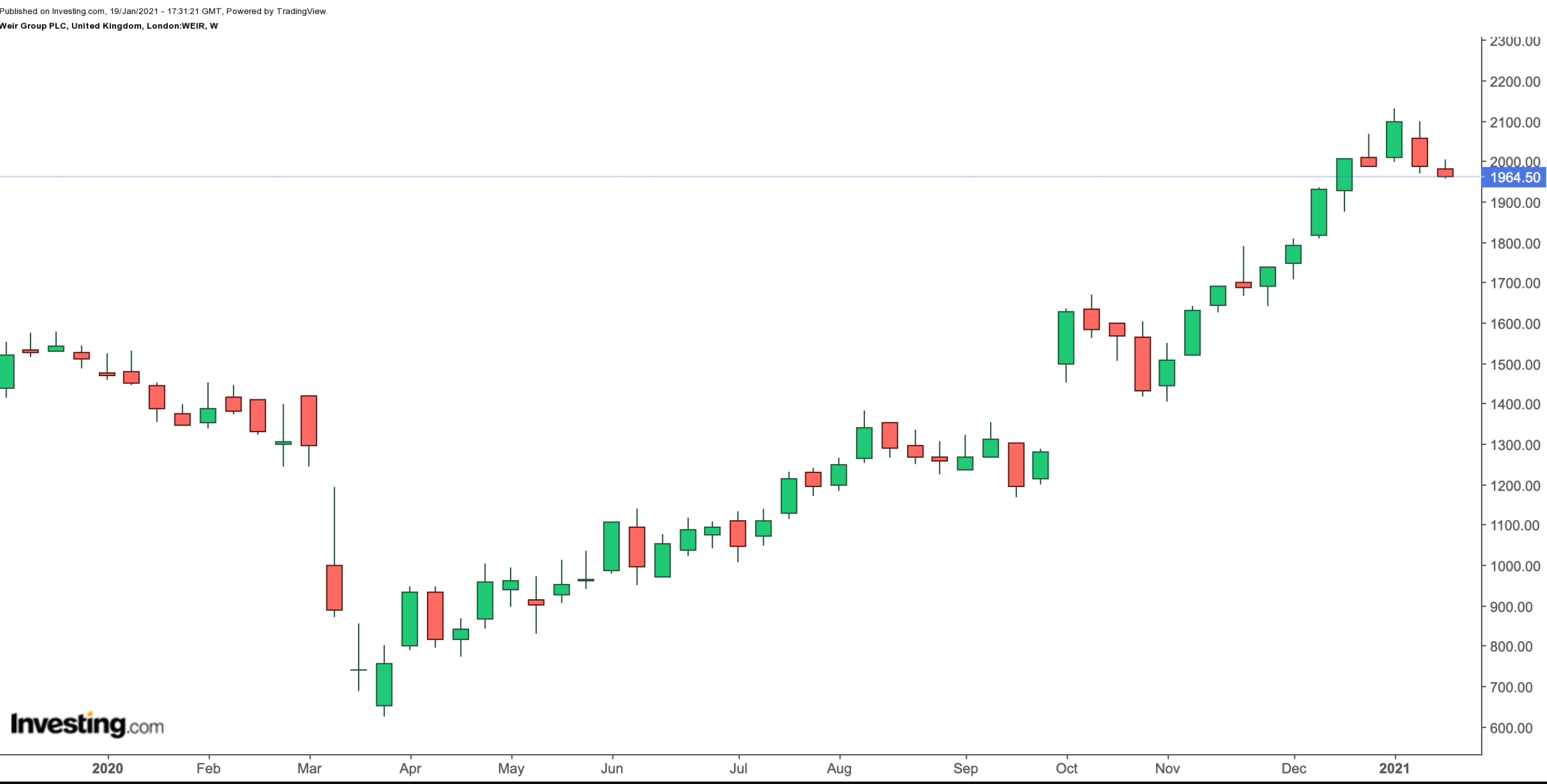As President-elect Joe Biden gets ready to take the oath of office later today in Washington DC, Wall Street wonders which stocks could continue to do well in future quarters. We recently discussed how alternative energy and infrastructure spending}} are likely to be high on the agenda, and introduced exchange-traded funds (ETFs) that could be appropriate plays for the coming months.
Today, we look beyond the borders of the U.S. and discuss an industrial business that could benefit from increased emphasis on the infrastructure sector, which, in part, relies on these firms. It is energy equipment maker Weir Group (LON:WEIR) (OTC:WEGRY), a member of the FTSE 250.
The stock delivered strong returns in the past year, gaining about 36%. On Jan. 19, WEIR stock closed at 1,964.50p ($13.50 for U.S.-based shares). With a market cap of £5.14billion (or $7.0 billion), it could become a candidate to be included in the country’s largest index, i.e., the FTSE 100.

Currently, the FTSE 100 is down 12% for the year, while the FTSE 250 has decreased by 6%.
The new year also means less certainty for many UK-headquartered global businesses. The country and the European Union have recently agreed on a free-trade deal and friendly cooperation, following the UK's departure from the EU. Many firms now look forward to improved economic conditions following the vaccine rollout.
Let's see if the group deserves to be on investors' radar in 2021.
How Recent Earnings Stack Up
The company’s history goes back to 1871, when the Weir brothers set up an engineering firm in the west of Scotland. They invented pumping equipment to be used in the steam ships being built in Clyde shipyards. Since then the firm has forged itself a strong reputation and loyal global customer base in engineering, procurement and construction management.
The group serves infrastructure, mining and energy customers worldwide. For instance, its pumps are used for mineral processing and help turn mined rock into valuable ore and its safety valves are installed in more than half of the nuclear power stations worldwide.
Globally, it has over 13,500 employees in more than 200 manufacturing and service facilities.
According to the most recent {{erl-6674||half-year results, revenue was £1.1 billion ($1.5 billion), down 18% year-on-year (YoY). Reported profit before tax was £63 million (or US$85.8 million), a decrease of 41% YoY.
CEO Jon Stanton said:
"The business is performing well…. More broadly, the long-term outlook for mining remains positive, supported by demographic trends, carbon transition, the long-term decline in ore grades and the need to reduce waste and water and energy consumption.”
In recent weeks, management announced the upcoming sale of its oil and gas division to Caterpillar (NYSE:CAT).
So far, investors seem to have given their seal of approval for the proposed transaction. Over the past several years, the company has seen robust growth in its mining operations, whereas the oil and gas business has been lagging significantly.
Management is expected to use cash from the sale to pay off debt and focus energies on the mining technology business.
Bottom Line
Despite the decline in revenue, shareholders were handsomely rewarded in 2020. Forward P/E and P/S ratios for Weir shares are 25.51 and 2.14, respectively. As a result of the run-up in price over the past year, the valuation is, however, on the frothy side. Although we like the company, we'd ideally wait for a pullback of 5%-7% before committing new capital into Weir Group.
Investors who are interested in Weir stock, but do not want to commit full capital to the shares could be interested in buying an ETF that has it as a holding. Examples include: the Invesco FTSE RAFI Developed Markets ex-U.S. ETF (NYSE:PXF), the iShares MSCI United Kingdom Small-Cap ETF (NYSE:EWUS) and JPMorgan BetaBuilders Europe (NYSE:BBEU).
